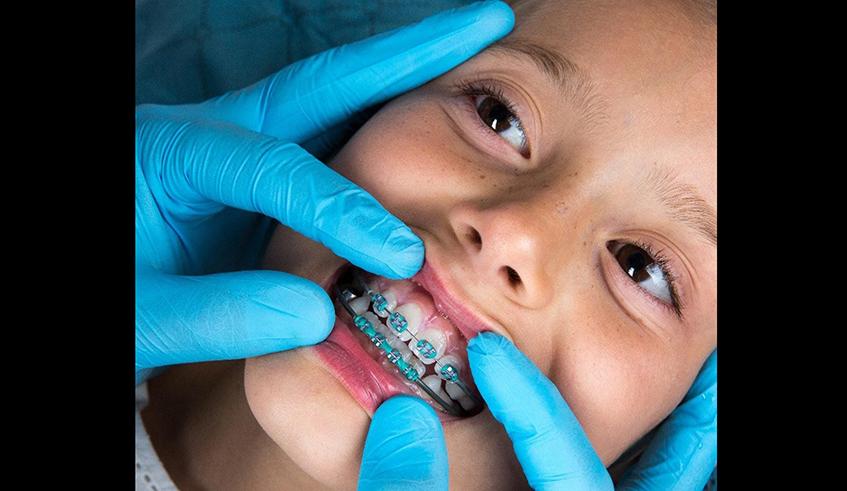Africa-Press – South-Sudan. You’ve probably found your own or child’s teeth to be a little crooked, and nowadays, wearing braces is becoming increasingly popular. Dentists say that dental braces are used to straighten crooked teeth, align upper and lower jaws, improve the aesthetics of smiles and faces, and relieve pressure on temporomandibular joints. Also, there is no age limit for dental braces.
According to Dr AbduKadir Mamataliev, a dentist at Deva Medical Center-Nyarutarama, when most people think of orthodontic braces, they think of teenagers. But an increasing amount of adults are getting braces, too. As long as your teeth and gums are healthy, you could benefit from getting your teeth straightened.
He says, one of the most important things to consider is the state of your gums and jawbones. If you have unhealthy gums, a lot of gum recession, or bone loss, braces may not be recommended because the pressure they put on your gums could cause unfavourable complications.
Braces make quick work of reshaping the look of your teeth and smile. Photo/Net
Dr Mamataliev says many people think that braces only make the teeth straight, but they accomplish a lot more than that. An orthodontist evaluates a lot of things when you go in for consultation. One of the most important things that orthodontists evaluate is your “bite”. This is the way that the top and bottom teeth meet when you open and close your mouth. Orthodontists are just as concerned with how your mouth functions as they are with making your teeth look great.
According to Dr Michel Mbonimana, a dentist at Kigali Adventist Dental Clinic, the patient should have proper oral hygiene. During orthodontic treatment, one may have struts or other attachments placed on their teeth. Food can easily get stuck which can cause permanent damage to the tooth enamel, this can occur if the teeth are not kept clean.
Therefore, one’s risk of tooth decay and gum disease may be higher during treatment. And so Dr Mbonimana recommends brushing and flossing regularly. He adds that teeth should be presented fully erupted. Tooth eruption is the movement of the tooth germ from its non-functional position in the alveolar processes to its final functional position in the oral cavity.
“Teeth shouldn’t be impacted. An impacted tooth is a tooth that has not passed through the gum-line to grow into position on its own. They occur when the teeth aren’t able to grow in properly on their own; either something is obstructing their movement. Doctors can do a surgical removal of all teeth impaction,” he says.
Mbonimana also says that there should be enough bone support, and no ankylosis (fused bones or other hard tissue). But also, age matters, the younger the better, and consider facial cranial growth.
Dr Mamataliev says that during consultation, an orthodontist will get to know you and take a good look at your teeth and your mouth. They will be able to tell you, with accuracy, what needs to be done, for instance, what type of braces to wear, whether you need extractions, how long your treatment might be, and an estimation of how much it will cost.
“Once you have picked an orthodontist, you will need to get a mould of your mouth done, and panoramic x-rays (and sometimes also photos of your face). Using these tools, the orthodontist will be able to develop a treatment plan for you. Until he does that, he will only be taking an “educated guess” at what needs to be done to fix your smile. Once he has worked up a treatment plan, he will know exactly what needs to be done. At that point, you will come back to his office, and he will explain all the details, including the exact cost,” Dr Mamataliev says.
He adds that when you have braces, you will need to brush your teeth several times per day, ideally after every meal. This may sound like hard work, but you’ll get used to it. In fact, you will want to brush your teeth often, because food gets stuck between your brackets, which can be really disgusting and cause bad breath and tooth decay. At the very least, you should rinse your mouth with water after eating.
In the article ‘Things You Should Know Before Getting Braces’, it states that there are some things you should know about braces before you dive into the orthodontic deep end.
“You may have a minor lisp when you get your teeth straightened with braces. Why? When you attach metal brackets to the teeth, there’s almost no way that it won’t impact the way you speak. Please don’t worry if you find your speech impacted after getting braces, you will get used to talking with the extra hardware in a short amount of time. This is a first step on the way to the straight teeth you’ve always wanted!
“Your teeth will change a lot in the first month alone. Braces make quick work of reshaping the look of your teeth and smile. In just the first month alone, you should notice a much straighter set of pearly whites. Just imagine what they’ll look like after you get then taken off.”






